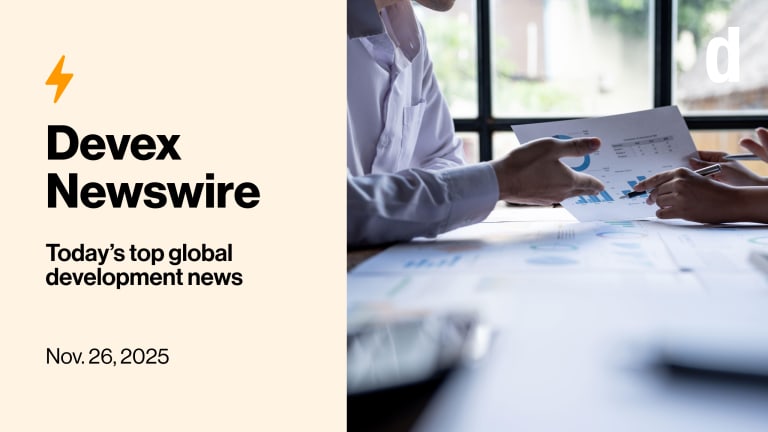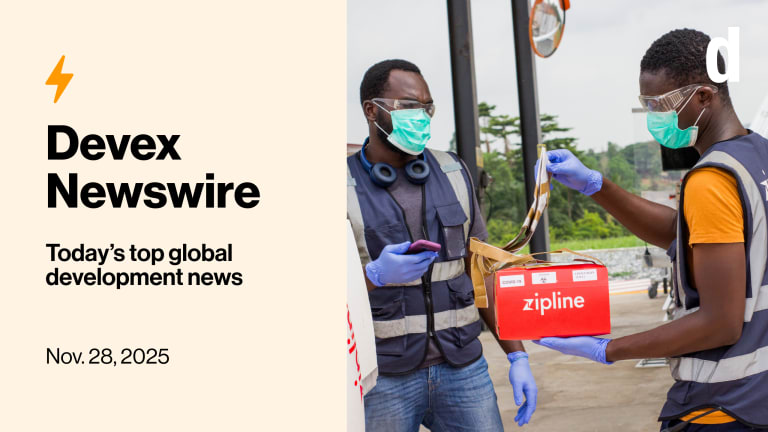
This is a preview of our daily Newswire. Sign up to this newsletter to receive an inside look at the biggest stories in global development.
The WHO Foundation’s mission to attract private sector donors is raising questions about conflicts of interest.
EXCLUSIVE: In an interview with Jenny Ravelo, the head of the recently formed WHO Foundation pushed back on recent criticism that his efforts to broaden the WHO’s funding base could open the international body up to conflicts of interest.
• The WHO Foundation was created after the COVID-19 pandemic and the Trump administration’s funding cuts revealed fragility in WHO’s financial support, which comes mostly from governments. The foundation was set up explicitly to be “more flexible in terms of engaging corporations,” Anil Soni, its first CEO, told Jenny late last year.
• Some health experts were already worried that the WHO Foundation’s mandate could allow companies to push their policy agendas by funding some priorities instead of others, or by gaining leverage over WHO. Those concerns grew louder when the foundation announced a $2.1 million donation from Nestlé. The company has faced criticism for its baby formula marketing, among other things.
• Soni says Nestlé’s donation will have no influence on WHO’s work as a normative global health body. “The WHO should be critical of a lot of companies and a lot of countries relative to their actions in terms of promoting good health. And we want the WHO to continue to do that,” he says.
Read: Exclusive: WHO Foundation pushes back against criticism over Nestlé donation
From the Devex Pro archives: A beginner’s guide to cryptocurrency donations
TURNING THE PAGE
“We’ll continue support for the rights of Afghan women and girls, minorities advocating for their meaningful participation in the ongoing negotiations and their equal representation throughout society, and we’ll maintain significant humanitarian assistance to those in need.”
— U.S. Secretary of State Antony BlinkenBlinken sought to reassure critics of President Joe Biden’s decision to withdraw all U.S. troops from Afghanistan by Sept. 11, 2021, that America would maintain a diplomatic and development presence 20 years after the start of the war.
NEARSHORING
Faced with export restrictions that have limited the availability of COVID-19 vaccines, African countries are looking to boost their own manufacturing, Sara Jerving reports. “What we have seen during this crisis is that international solidarity is very fickle. It is very volatile,” says Donald Kaberuka, African Union special envoy on COVID-19.
The continent currently imports 99% of its vaccines, but some want to see local production hit 60% by 2040. “We are fully aware that this will be a challenge. But we are also fully aware that a journey of 1,000 miles begins with a single step,” says Dr. John Nkengasong, director of Africa CDC.
Read: AU launches Partnership for African Vaccine Manufacturing
IT’S COMPLICATED
The Biden administration’s efforts to curb migration from Central America drew fire from Republicans on Wednesday, Teresa Welsh reports. Lawmakers criticized the White House’s decision to reverse course on some Trump administration policies while pressing aid officials to show faster results.
Biden’s special envoy for the Northern Triangle called current migration levels “part of a recurring pattern,” while several members of Congress repeatedly referred to the situation on the border as a “crisis.”
Read: Teresa’s readout from the House Foreign Affairs subcommittee hearing.
DONOR DARLING
“If you're an academic who is studying Rwanda, if you're a journalist who wants to be able to get media accreditation in Rwanda, if you're a diplomat, there are certain subjects you just stay well clear of.”
— Michela Wrong, author of “Do Not Disturb”Vince Chadwick speaks to Michela Wrong about her new book on the assassination of Patrick Karegeya, political opponent of Rwandan President Paul Kagame — and why more people have not been disturbed by events in the East African nation over the past 27 years.
Read: New book puts fresh scrutiny on 'donor darling' Rwanda
ON TODAY’S DOCKET
• Samantha Power’s nomination to lead USAID is scheduled for a vote in the Senate Foreign Relations Committee today. Background reading: Power shares vision for an elevated USAID.
• The U.S. is co-hosting a COVAX “investment opportunity” today, as the vaccine distribution platform faces a shortfall of 211 million doses in the next three months. Half of the Biden administration’s $4 billion pledge to COVAX is meant to leverage contributions from other donors.
IN THE NEWS
WTO chief Ngozi Okonjo-Iweala urges countries to advance negotiations on intellectual property waivers for COVID vaccines, despite eight failed attempts. [Reuters]
The U.N. will launch a funding appeal for people who have been affected by volcanic eruptions in Saint Vincent and the Grenadines, where 20% of the population is currently displaced. [The Guardian]
Norway wants proof of Brazil's work on reducing deforestation in the Amazon before releasing more funding aimed at preservation efforts. [Reuters]
Sign up to Newswire for an inside look at the biggest stories in global development.








